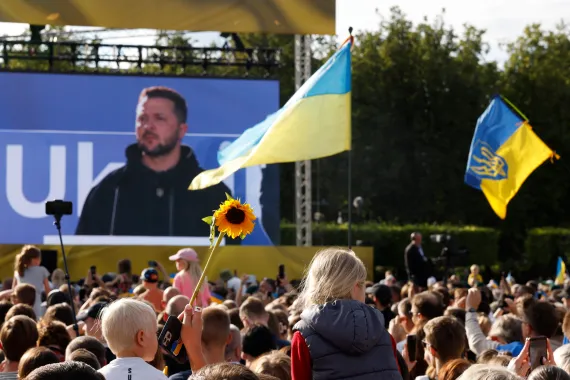NATO declines to provide Ukraine with a specific timeline for membership.
NATO member states have responded to criticism from Ukrainian President Volodymyr Zelensky regarding the delay in Ukraine’s accession to the military alliance by stating that Ukraine can join “when allies agree and conditions are met.” In a communiqué, NATO acknowledged the need to expedite the process but refrained from providing a specific timeline. President Zelensky expressed his disappointment, noting a perceived lack of willingness to invite Ukraine to join NATO. While acknowledging that Ukraine cannot join NATO while engaged in conflict with Russia, President Zelensky expressed the desire to join as soon as possible after the fighting concludes. He raised concerns that the absence of a defined timeline for membership could result in Ukraine’s inclusion becoming a bargaining chip in negotiations with Russia. The NATO summit is currently taking place in the Lithuanian capital, Vilnius, where President Zelensky is in attendance.
NATO has not outlined the exact details of Ukraine’s accession to the alliance. However, diplomats stressed that they have established a clearer path to membership, significantly streamlining the rigorous application process. The alliance acknowledged Ukraine’s increasingly interoperable and politically integrated armed forces with NATO, pledging continued support for democratic and security sector reforms in Ukraine. Diplomats also highlighted the establishment of a new NATO-Ukraine Council, which convened for the first time on Wednesday and grants Kyiv the right to convene meetings of the entire alliance.
Nevertheless, the decision not to provide a specific timeframe for Ukraine’s membership is viewed as a setback for the country. While the absence of such details was expected, President Zelensky’s criticism of the lack of a timetable underscores the perceived failure in diplomatic efforts. Some member states are concerned that granting Ukraine near-automatic membership could incentivize Russia to escalate and prolong the conflict. The focus now shifts to determining long-term security guarantees that NATO members can offer Ukraine as an alternative to immediate membership. In the past, Western security assurances failed to deter two Russian invasions, so NATO allies hope to provide a robust and explicit response that convinces the Kremlin that further aggression would be too costly.
During a later address to the crowds in Vilnius, President Zelensky expressed confidence that NATO would ensure Ukraine’s security, thereby strengthening the alliance. He also presented a battle flag from the city of Bakhmut, which was destroyed during Russia’s invasion of Ukraine and witnessed one of the longest and bloodiest battles.
The Vilnius summit follows Turkey’s recent decision to drop its opposition to Sweden’s NATO membership. Turkey had previously blocked Sweden’s application, accusing it of harboring Kurdish militants. With Turkey’s approval, Sweden will become the alliance’s 32nd member, joining Finland, which joined in April. Both countries expressed their intent to join NATO following Russia’s invasion of Ukraine.
